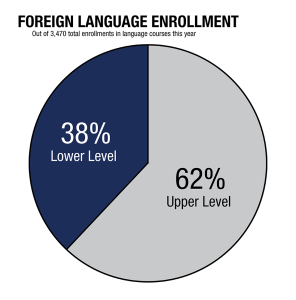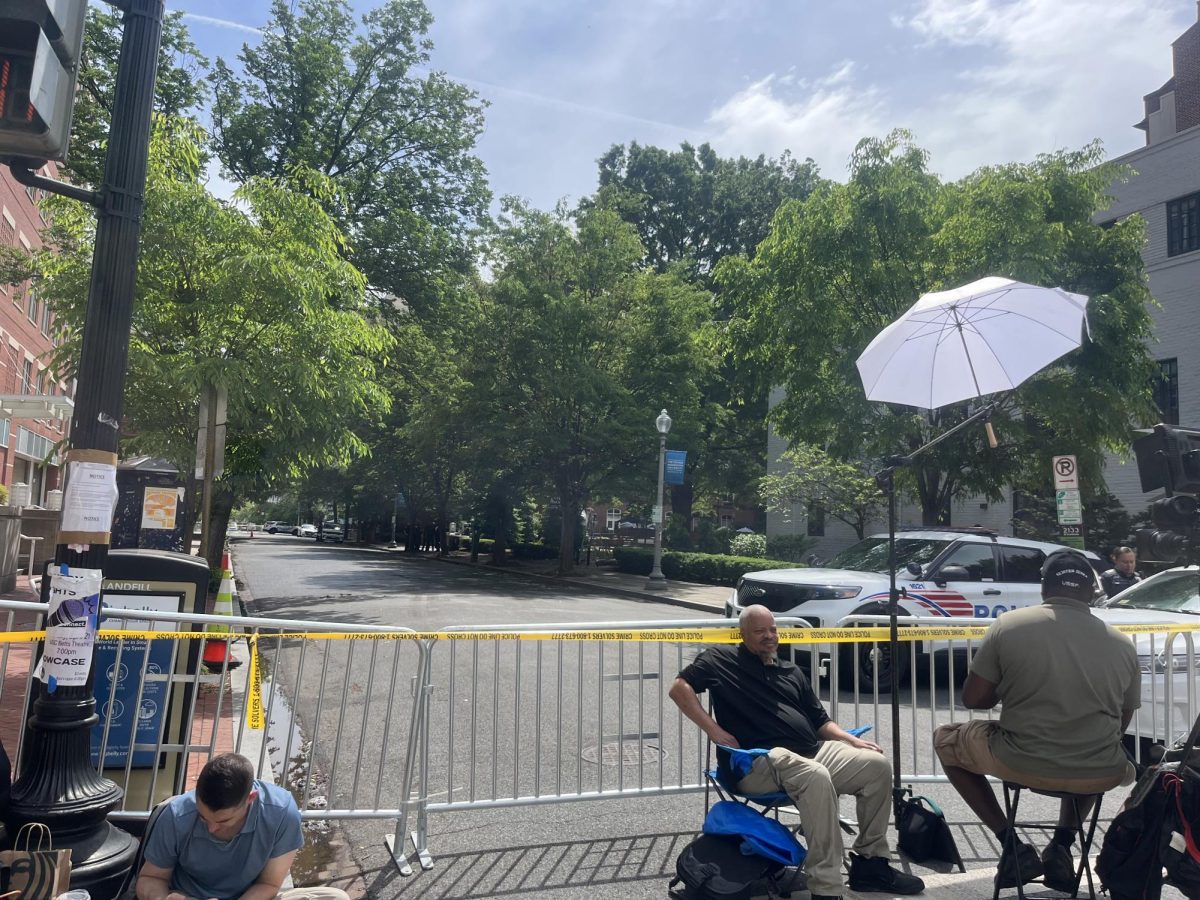
Georgetown is unique for its proportion of students in advanced language levels.
The Modern Language Association released a report that surveyed 2,435 two- and four-year institutions’ foreign language course enrollment, revealing a 6.7 percent decline in foreign language course enrollments in universities around the country. According to French Department Chair Andrew Sobanet, who also serves as the convener for the Faculty of Languages and Linguistics, Georgetown saw a 4.8 percent drop in foreign language enrollment during the same time period.
Sobanet pointed to the interest of Georgetown students in global affairs as a mitigating factor against the national trend.
“Foreign languages are at the core of Georgetown’s educational mission as a global, student-centered research university,” Sobanet wrote in an email. “The study of language, cultures and literature affords students a rare opportunity for dedicated mentoring from faculty, intellectual and personal growth and a deep appreciation of cultural differences.”
While the total number of foreign language enrollments decreased between 2009 and 2013, languages such as Korean, American Sign Language and Chinese increased in popularity.
Additionally, Georgetown College Associate Dean Sue Lorenson noted that Arabic enrollments increased after the events of Sept. 11, while Russian enrollments have increased recently, pointing to political tensions in the Caucasus region as a possible explanation. Despite the decline in enrollment, there are still more Russian majors in the class of 2015 than there are biochemistry or physics majors.
“Trends in language study are intricately tied to immigration patterns, political uprisings, economic booms and crises, and cultural shifts,” Lorenson wrote in an email. “Georgetown students are savvy and often internationally focused, and we’ve seen language enrollments wax and wane as the world changes.”
According to Lorenson, there are 3,470 enrollments in language courses this semester. Thirty-eight percent of those enrollments are in lower-level courses, which are courses at or below the level required to meet the College’s language requirement.
On the other hand, 62 percent of the enrollments are in upper-level courses, which Lorenson said makes Georgetown unique, as language enrollments are typically concentrated at the introductory level at many universities.
SFS Associate Dean Emily Zenick said that the dean’s office strongly encourages SFS students to pursue foreign language study after passing the language proficiency exam.
“It’s not ‘proficiency’ on a transcript that proves you speak a language,” Zenick wrote in an email. “If your last language class taken is in the first year and you take no others, what can you really claim about ‘proficiency’ at the time of graduation?”
Despite the apparent relative popularity of foreign language study compared to other universities, Dean of the College Chester Gillis said the decline in the number of students majoring in foreign languages was likely a consequence of the financial crisis in 2008, resulting in more students choosing to major in economics and science, technology, engineering and mathematics disciplines.
“These choices may be dictated by students themselves,” Gillis said. “They may be dictated by parents and families that are suggesting these particular majors, thinking that they will lead to gainful employment more quickly or more easily. Or more lucrative employment, perhaps, and that may or may not be true.”
Lorenson wrote that there was a measurable drop in the number of humanities majors, which includes foreign language majors, between 2012 and 2013. These graduating classes were comprised of students who began college in 2008.
According to the National Association of College and Employers, foreign language majors have the highest starting salary among humanities majors.
With the marketable skill of bilingualism and the experience of studying abroad, which is a requirement for most language majors, foreign language majors distinguish themselves from other job candidates, according to Lorensen.
In light of globalization, Gillis said that most large companies are multinational who might want to hire candidates who understand different cultures.
“I think if we are educating global citizens, which we are at Georgetown, we have a responsibility to educate them in the full domain of that,” Gillis said. “There’s a significant benefit to this in your career and your life when you can translate between cultures. … [Languages] provide a window to another world, just the way biology perhaps provides a window to another world in the biological sciences.”















Foreign Language Student • Feb 27, 2015 at 9:47 pm
Strange that national trends are tending more and more to declines in foreign languages now that the world is becoming increasingly globalized.
One thing that the Hoya does not do in this article is mention the QUALITY of the language classes. I am a graduate student here at Georgetown, and during my undergrad I have taken many foreign languages classes, including several in Korean, French, Spanish, Chinese, and even Catalan, and all were EXCELLENT.
When I arrived to Georgetown, I was thoroughly disappointed with the foreign language classes here, ESPECIALLY Korean. Reading this article, I was very upset that the aspect of quality was not mentioned, and I was particularly upset to see that Korean was one of the languages that saw an increase in enrollment despite its poor quality here. This article gives that department good publicity when in reality it needs to be changed for the better.
A six-credit language class costs $10, 000, and the Korean class is one of the absolute biggest wastes of time and money at this school. I am only here for one and a half years, and since I can’t start Japanese or Chinese in the middle of the year (second semester), I’ve essentially wasted a year of potential language study, time, and money because of the poor quality of that department.